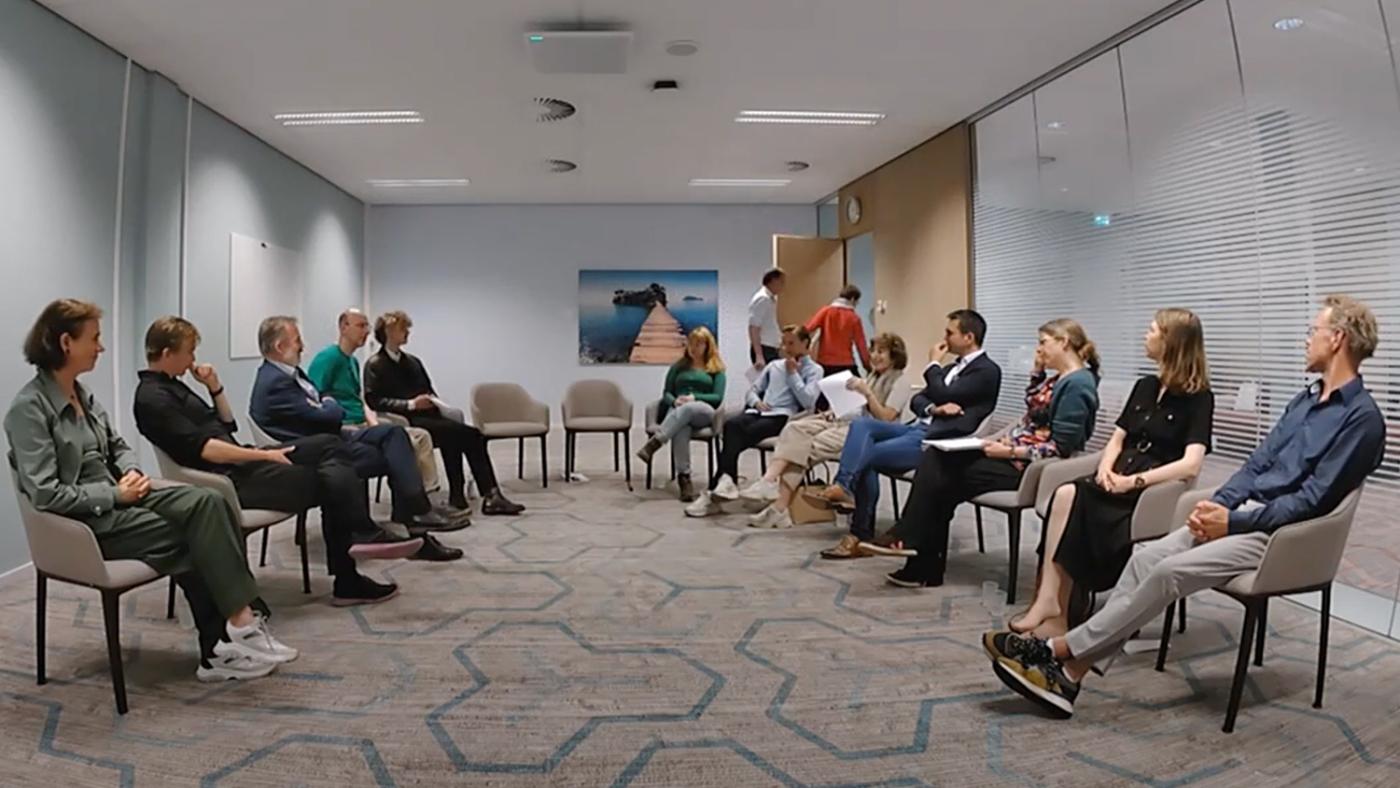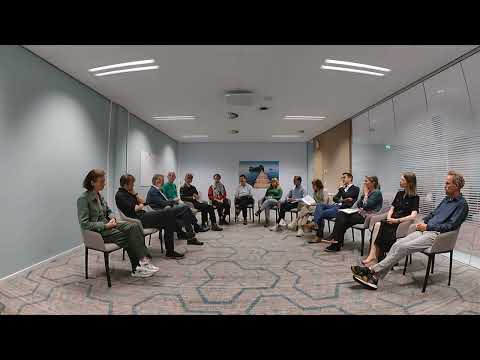Call for better discussions about thorny subjects
Activist walks out of UU dialogue about Palestine. Now what?

An empty chair. It was an image that spoke volumes to the two hundred or so students and staff who followed the live-streamed dialogue about Gaza and Israel organised by UU on July 12. The event was also posted on YouTube later.
Law student Itai van de Wal, a representative of the student movement UU Encampment, left the Administration Building, where the event was held, after giving a statement in which he dismissed the approach and format of the meeting as “disrespectful” of the Palestinian population in Gaza.
Moderator Bald de Vries needed a moment to recompose himself after Van de Wal’s departure, saying he felt as though he'd been “left hanging”. The other twelve participants – three students, six staff members and three administrators – also seemed surprised.
Dissatisfaction with dialogue set-up
Although the organisation of the event hadn't gone smoothly, many hoped it would be a moment of reconciliation or, at the very least, the first public exchange of ideas. But no nice talk happened between UU's Executive Board and the students demanding the university sever all ties with Israeli institutions.
UU staff members affiliated with the group Staff for Palestine had already decided not to attend the event, announcing their own “UU community” gathering instead. Van de Wal's statement echoed the rejection letter written by Staff for Palestine, criticising UU's choice of set-up UU for the dialogue. According to him, the activists had already taken the first step to start a conversation and asked for an event with a "live" audience, in which the activists and the Executive Board would discuss concrete steps the university would take to investigate its collaborations with Israeli universities.
According to critical students and staff, the Executive Board tried to use the event's set-up and the composition of the participants (which included the Jewish Law student Benjamin and the Jewish Emeritus Professor Sonja de Leeuw) to shift the focus of the debate to how the university could create a "safe environment". Van de Wal, who is also Jewish, said: “The Executive Board is hijacking a debate about what should be done, making us talk about how we should feel instead." He was visibly angry.
Rector Henk Kummeling then stated that Van der Wal's up-and-leave was illustrative of the board's exchanges with the activists. The frustration was palpable, as the Executive Board seemed to have reached an agreement with the students and staff members about their participation in the event. “We’ve tried all manner of things to organise a dialogue, but it doesn’t go anywhere because it can only happen if it meets the conditions set by those in favour of boycotting Israeli universities.”
In the end, the Executive Board and the activists accuse each other of not wanting to have a conversation. This seems to be the status quo, which resulted in an empty chair. “It is what it is”, concluded De Vries, who has recently left the position of Education Director at the Faculty of Law to take up the directorship of the Centre for Academic Teaching and Learning.
In the squeeze
The impact of Van de Wal's words was clear. The remainder of the gathering, which lasted one hour, mainly discussed how difficult it is to talk about the conflict. In this context, UU's role was also discussed. Shouldn’t the university take a more active role when it comes to promoting a debate, making itself heard in such gatherings?
According to Kummeling, that's actually very tricky. He said the Executive Board is “in the squeeze”, criticised from both sides because its members are ultimately the ones making the decisions. In his view, giving the Executive Board a prominent place in gatherings like this would get in the way of a proper debate. “The board must not take centre stage, as this would only increase polarisation.”
The conversation should take place nevertheless, Kummeling continued. The rector regrets that people have the impression that the Executive Board blocks all kinds of gatherings for safety reasons. In many cases, he said, organisers or potential participants are the ones that pull out in what he calls a kind of self-censorship.

Struggling with normative conversations
Other participants stressed the need to engage in conversations with one another. Not just about Palestine, but about other emotionally charged topics too. Several participants remarked that many students and employees find it hard to carry on a "normative" conversation, so classes and faculty members should pay more attention to this.
Geosciences lecturer Jeroen Oomen believes that, if nothing else, this shared insight should be seen as the only positive outcome of the gathering. One of the participants in the debate, Oomen sympathises with the protesters and their goals. At this own faculty, Oomen was in favour of cutting ties with an Israeli university that is involved with a European research project.
Although he "would have preferred no one to leave", he was able to muster “some understanding” for Van de Wal’s walking out. “There’s a lot of mistrust going on and that comes from somewhere." In his view, many activists get the idea that the university pays more attention to certain groups. The difference in goodwill towards Israel versus Palestine is particularly sensitive.
Oomen is disappointed that universities shied away from engaging in a substantive debate about the situation in Gaza last spring. In his opinion, they hide behind the wish to take up a “neutral” position, which is counterproductive. “Neutral knowledge doesn’t exist. A university is a political entity by definition. If you try to deny or obscure that, you only feed juxtapositions and polarisation.”
Without launching a personal attack on UU administrators over this matter (“it's clear they are struggling too”), he said that the lack of decisiveness and persuasiveness of top-level university administrators bother him. “Such an attitude seems very concerning to me, especially given the current political climate and the cost-cutting efforts of the new cabinet.”
For all these reasons, he had “conflicting feelings” about joining the dialogue. “If you had held such a gathering at the beginning of the academic year, it may have been useful. Now it is far too late and far too short. In hindsight, my feeling that the whole thing is a bit insubstantial isn’t gone, but I would like to see it as a good step towards regaining mutual trust. Most of the students and staff who turned away from the Executive Board recently are pleasant, rational people with whom you definitely can have a conversation.”
Marker
Law, Economics and Governance Dean Elaine Mak was the third administrator to participate in the dialogue, alongside Rector Henk Kummeling and UU Vice-President Van der Starre. She says it’s a pity that Van der Wal (who once took a Master’s course she taught) wasn’t prepared to join the discussion.
“I think it’s a missed opportunity. I was really curious about his contribution. Luckily, we still have different points of view here, but that empty chair demonstrated that a perspective was missing.”
Mak was nonetheless happy that a mixed group of people, comprised of students and staff with different backgrounds and university administrators, came together for the first time to discuss the theme. “And it was broadcast for everyone to see. We laid down a marker, the very beginning of the route we have to take.” She doesn’t fully agree with the criticism that the university is too late in organising such debates, though. “In hindsight, that’s always easy to say in times of consternation.”
At the same time, she acknowledged that a substantive conversation only gained momentum in consultative bodies and academic sessions when the protests were already taking place. “It’s also proven very difficult to find a common ground. Besides, some debates weren’t all that fruitful because they targeted specific administrators.”
The dean thinks that “a greater sense of direction when it comes to knowledge-sharing and debates” is needed at the university. She doubts whether a conversation with the more radical activists will be possible in the short term. In the months ahead, she would like to focus on “the large group of students and staff who have adopted a quiet, wait-and-see attitude so far”. The Utrecht Centre for Global Challenges will organise a gathering to discuss values and moral dilemmas at play in research collaborations. The topic will be discussed broadly, so the event will not be only about Israel.
Mak: “These gatherings are very important. We are facing a considerable number of complicated questions at our university, such as social safety and the impending budget cuts. We want to involve as many students and staff in these matters as possible. They must be able to make their own choices when making their voices heard in debates. What moves others? What is urgent?”
The dean didn't say it that directly, but there is a fear across the university that internal disagreements concerning Israel and Gaza, as well as the unavoidable debates about the budget cuts announced by the government, will get intermingled and mutually reinforcing. Fellow dean Thomas Vaessens, from the Faculty of Humanities, recently brought up this fear in a faculty council meeting. He stressed the importance of departmental talks.
In Mak's view, university administrators cannot ignore the feelings of powerlessness and mistrust that some groups have. When it comes to the Palestine issue, the new assessment framework for research collaborations (yet to be adopted) may be of some help. It incorporates legal and ethical considerations, among other things. “This may help us make choices and do a better job explaining the choices we make. But communication between stakeholders with different views will always remain a two-way street,” she emphasised.
Opportunity to have a conversation
Despite the disappointment about Van de Wal’s up-and-leave, a spokesperson for the university indicates that the Executive Board is pleased with how the dialogue went. According to the board, for a long time, it wasn't clear to the UU community that the university's administration was paying plenty of attention to this topic. The spokesperson adds that the live-streamed event met a need, felt by many people at UU, to gain insight into different considerations. “In addition, it was an opportunity to have a conversation with various groups within our university, and allow different students and staff to talk to each other.”
According to the Executive Board, the dialogues that were started at several places across the university before the summer break will be continued. Administrators and supervisors will be assisted in organising and guiding these sessions. One of the main goals of these gatherings is to talk about “how to handle differences respectfully and how to maintain a conversation when a boundary is crossed (intentionally or not)”, the board states.
The need for new initiatives targeted at the entire university is being investigated. In addition, the Executive Board is keeping communication channels open with all groups and individuals involved in the debate about collaborations with Israeli universities.
Only option
Itai van de Wal says he didn’t watch the rest of the gathering. “But others told me it was an excruciatingly pointless debate.” He adds that it’s “regrettable” that he had to mislead mediator Bald de Vries, the very man he (as well as others) suggested for the role. “But this was the only way we had left to tell the few people that were watching that the board’s intentions when organising the event weren’t good and explain why.”
Van de Wal reiterates that UU Encampment is still open to conversation. “But it would have to be a meeting where the Executive Board is actually prepared to be held accountable and take concrete steps.”
Until that time, students will keep protesting. He feels like support for his views is growing. “In the end, the Executive Board will stand alone. It’s just a matter of time. Time Gaza doesn’t have, unfortunately.”